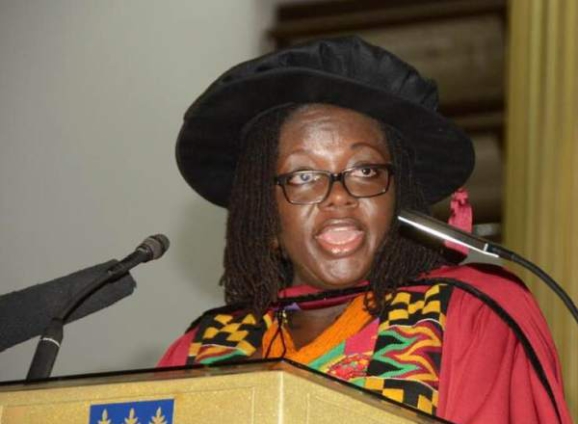President Akufo-Addo has assured the first female vice-chancellor of the University of Ghana, Professor Nana Aba Appiah Amfo of his full support to help her succeed in office.
Speaking at the induction ceremony of Prof Amfo on Tuesday on the Legon campus, the President said the reforming process of the country’s educational system requires government to provide support to leaders of educational institutions.
“Our country is undergoing some significant reforms in its educational system. The most far-reaching of which is the significant broadening of access to education at all levels of educational structure.
"It is as well that it should be so. We need to mobilise all the talents and resources of the entire population without discrimination or reserve to make the decisive push for the social and economic transformation which we all seek for our beloved nation of Ghana,” Akufo-Addo said.
President Akufo-Addo expressed his confidence in the newly appointed Vice-Chancellor to execute a formidable task.
“Those who have the privilege of leadership in our educational structure have unprecedented challenges before them. I am confident that the premier university, the status that would be attached to Legon forever, has in our new vice-chancellor, chosen a person who would be adequate for this formidable task.”
“You will definitely have my support and I will be hopefully, your successful advocate with the minister for finance,” Akufo-Addo noted.
President Akufo-Addo congratulated the university council under the leadership of the former Chief Justice Sophia Akuffo for their decision to appoint Professor Nana Aba Appiah Amfo as the vice-chancellor of the University of Ghana.
“With the female Chancellor in the person of Mary Chiney-Hesse, males in the academic hierarchy of Legon may well begin to feel a threatened species. I believe they have no cause to worry. It just happens to be the time of the women. It is ok, they have waited long enough,” the President said.
Profile of Professor Appiah Amfo
Professor Nana Aba Appiah Amfo was born in Kumasi. After completing her nursery education at the then University Primary School (now KNUST Basic School), she continued her basic education at Services Primary School (Takoradi) and Goldfields Schools Complex (Tarkwa).
She had her O’ Level secondary education at Holy Child School in 1988 and her A’ Level secondary education at Archbishop Porter Girls’ Secondary School in 1990.
In 1991 to 1996, she proceeded to the University of Ghana for a Bachelor’s degree in French and Linguistics. She obtained her MPhil (2001) and PhD (2007) degrees in Linguistics from the Norwegian University of Science and Technology in Trondheim, Norway, where she studied with sponsorship from the Norwegian government under the then Quota Programme.
Professor Amfo received additional training in higher education management and leadership from Harvard Business School, University of Applied Sciences, Germany, and INSEAD, France.
Her career in academia started in 2001 as a Lecturer in the Department of Linguistics after her Master’s degree. After obtaining her PhD degree in 2007, she was promoted to a position as a Senior Lecturer.
Four years later on, she became an Associate Professor in 2011 and subsequently as a Professor in 2017. Professor Amfo’s research interests are in the linguistic sub-discipline of Pragmatics, which allows her to explore the role that context plays in our conversational interactions and how that influences communication in different domains.
Her research works have been published by several publications in national and international reputable journals such as Acta Linguistica Hafnensia, Current Issues in Language Planning, Discourse and Society, Ghana Journal of Linguistics, Journal of Pragmatics, Journal of West African Languages, Legon Journal of the Humanities, Lingua, Linguistics, Nordic Journal of African Studies, Nordic Journal of Linguistics, Pragmatics, and Studies in African Linguistics, have covered the role of function words in communication, information structure, grammaticalisation, language use in specific domains such as health, gendered contexts, politics, religion and migratory contexts.
Latest Stories
-
Level 100 university student remanded in custody for defilement
11 minutes -
Joe Nana Adarkwa quits Ampem Darkoa Ladies after nine years
32 minutes -
Passenger plane flying from Azerbaijan to Russia crashes in Kazakhstan with many feared dead
1 hour -
Blake Lively’s claims put spotlight on ‘hostile’ Hollywood tactics
2 hours -
Church of England must repent, leading cleric says at Christmas
2 hours -
DJ Stiga wins Hitz FM’s 2024 Hottest DJ contest
2 hours -
‘Yes, I voted for myself!’ – Cheddar addresses election rumors, calls for electoral reforms
3 hours -
Akufo-Addo approves visa-free entry to Ghana for all African nationals
3 hours -
Let us reflect, refocus and rebuild our party – Kwaku Appiah urges NPP members
4 hours -
24-year-old unemployed remanded for unlawful entry, stealing
4 hours -
I will deliver on my promises - Ashaiman MP
4 hours -
IPR Ghana congratulates President-elect Mahama
4 hours -
BoG Governor warns of cyber threats, urges investment in security
4 hours -
Ensure safety on roads this festive season – Drivers, road users urged
4 hours -
Those calling for our removal don’t understand our responsibilities – Bossman Asare
4 hours

